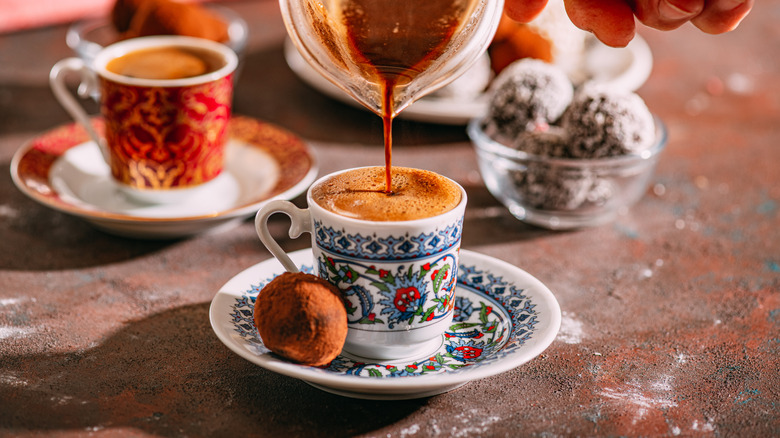If You're Drinking Turkish Coffee On The Go, You're Doing It Wrong
If you follow a personal morning or nighttime "ritual," then you know that a round of stretching, a hot shower, or lighting a favorite candle can go a long way toward grounding yourself spiritually. In Turkey, the seemingly everyday act of drinking a cup of coffee is revered with this level of ritualistic respect.
Other than adding sugar to the brewing grounds, the number one thing that makes Turkish coffee different from your regular go-to cup of drip is the way it's enjoyed. While a paper cup might be fine for bringing a cuppa joe along while you run errands, if you're sipping your Turkish coffee out of anything other than ceramic, you're probably doing it wrong. It's not about the ceramic material — it's about the implications of sitting down with a deliberate, unhurried cup-full. In Turkey, coffee drinking is at least as much about the actual brew as it is about hospitality and community (even though Turkey also drinks the most tea of any country in the world, but we digress).
Forget pour-over and French press. The Turkish coffee ritual is the oldest method of brewing coffee in the world. In nearby Saudi Arabia, there was a time when not providing your wife with coffee beans was recognized as a legitimate legal reason for divorce. Per the lore, in 17th-century Turkey, it wasn't uncommon for sultans to choose their wives based on who in the Ottoman court made the best cup of coffee.
Not just absent-mindedly consuming caffeine (not to point fingers)
While the rites surrounding coffee drinking might have changed over the years, the passion never lessened. In 2013, the Turkish coffee ritual was officially added to UNESCO's Intangible Cultural Heritage List, and modern fans are keeping the flame strong.
Unlike drip coffee, the grounds in Turkish coffee don't get filtered out. Instead, the coffee is ground ultra-fine, finer than espresso, and dissolved in water, so that when the grounds inevitably sink to the bottom of each cup, it's not unpleasant to drink 'em down. In fact, in modern-day Turkey, tasseography (reading the coffee grounds left at the bottom of the cup) is a beloved tradition of fortune-telling, which also perpetuates the dogma of coffee drinking as an opportunity to slow down, connect with others, and savor the moment. Reading another person's coffee grounds invites folks to share about their personal lives, entering a deeper level of conversation and vulnerability. As an extension of this, Turkish coffeehouses are organized to facilitate social connection with games like Backgammon and hosting community events like comedians and musicians.
Turkish coffee is also often served with a snack or after a meal. Pair it with a slice of this Cinnamon Orange Coffee Cake or this Chocolate Turkish Coffee Cake with molasses and cardamom. Most importantly, call up a friend to share it with you.

